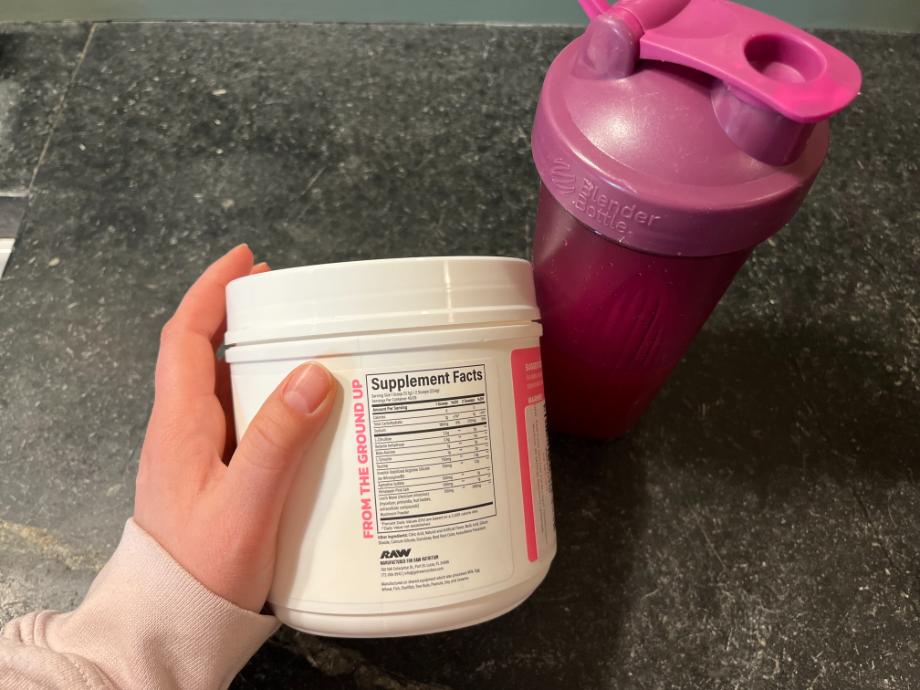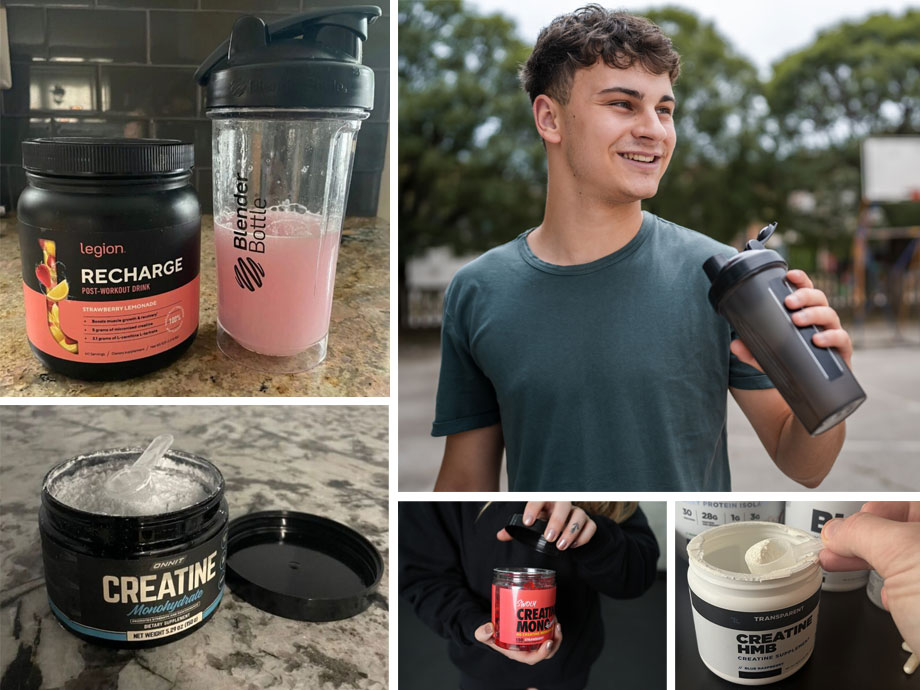Caffeine is the core component of many pre-workout dietary supplements, designed to be taken about 30 minutes before exercising to help improve your athletic performance. The primary function of caffeine in pre-workout products is to deliver an energy boost and increase focus so you can have more impactful workouts. As you can see, there are more benefits to taking caffeine pre-workout than just waking you up.
If you’re new to sports nutrition supplements, you may have wondered how much caffeine is in pre-workout and how much you should take. Will the caffeine in pre-workout have you dialed in with good energy or bouncing around the gym like a kid on a sugar high?
RELATED: Coffee Pre-Workout
I’m a registered dietitian here to help you understand why caffeine is in so many pre-workout supplements and explain what you need to know about how much caffeine is safe to take. Here’s the buzz!
Medical disclaimer: This article is intended for educational and informational purposes only. It is not intended as a substitute for medical advice. For health advice, contact a licensed healthcare provider. GGR also recommends choosing a product that has been third-party tested for quality.
Benefits of Caffeine
Let’s start with the benefits of caffeine. Caffeine is a stimulant, which the Food and Drug Administration (FDA) defines as a drug that increases mental alertness and helps you feel more awake when tired. It’s also a well-studied ergogenic aid1, meaning it may enhance physical performance during exercise.
RELATED: Best Pre-Workout For Cardio
If you’re debating which pre-workout to try, we definitely recommend a pre-workout that contains some level of caffeine, granted you can tolerate it. Research shows caffeine greatly benefits exercise performance2. Whether you’re a pro athlete or new to fitness, caffeine may help you crush your goals.

Here’s what you can expect:
May Enhance Energy and Mental Focus
Just like your morning cup of joe, pre-workouts with caffeine help wake you up, boost cognitive function, and sharpen mental focus. Caffeine increases alertness by binding to adenosine—a neurotransmitter that triggers sleepiness/relaxation—receptors in the brain2. When caffeine attaches to those receptors, there’s less adenosine in your nervous system to make you feel ready for a nap.
RELATED: How To Make Protein Coffee
May Improve Endurance
Caffeine has been shown to help improve endurance during aerobic and high-intensity exercise2, so you may find you can bike or swim an extra lap or tack on a few more reps to your next HIIT session. Better endurance means you’ll be able to do more work before fatigue sets in.
May Boost Strength and Power
Caffeine can help you feel stronger, which may translate to more powerful movement during weightlifting or powerlifting2. It’s also been linked to improvements in reaction time and sport-specific movements, like sprints and jumps2.

RELATED: Powerlifting Workout
May Support Fat Loss
Some studies have found taking caffeine before physical activity increases the amount of fat burned during exercise3, which can help support weight loss goals, especially in new gym-goers living with obesity.
How Much Caffeine Should You Take?
Without a doubt, research supports the use of caffeine to increase energy and power during exercise. Most of the time, I subscribe to the “too much of a good thing is great” way of thinking, but that doesn’t apply to caffeine consumption. So, how much caffeine should you be getting from a pre-workout?
Studies have found taking three to six milligrams of caffeine per kilogram of body weight before working out2 delivers the most benefits. Most pre-workouts have a caffeine content of 150 to 400 milligrams per serving, with 200 milligrams or less considered middle of the road and 300 milligrams or more considered high in caffeine.
RELATED: Pre-Workout Vs. Energy Drink
Before you go turbo-charging yourself with a high-stim pre-workout, consider the other sources of caffeine you consume. Coffee, black and green tea, soda, energy drinks, and chocolate are also sources of caffeine that contribute to your total daily caffeine intake.
The most current Dietary Guidelines for Americans recommends adults limit caffeine consumption to no more than 400 milligrams of caffeine4 per day. The FDA considers this amount safe for most adults without causing adverse side effects or negatively impacting health.

Those guidelines mean most people should try to keep total caffeine intake from pre-workout and other sources at or under 400 milligrams per day. Taking in more caffeine than that could increase the risk of side effects and caffeine toxicity. Pregnancy and breastfeeding come with a lower caffeine recommendation—about 200 milligrams.
Of course, caffeine tolerance is highly individual, and 400 milligrams may be too high for some, while others may handle a high-stim pre-workout without issue. Regular caffeine consumption can build up your tolerance. Genetics also play a role in determining your caffeine tolerance. Some people’s genetic makeup allows them to metabolize caffeine quickly, while others may be slower to clear caffeine from their systems.
A 2022 study in the European Journal of Nutrition5 concluded that using more moderate amounts of caffeine based on body weight can provide exercise benefits while minimizing the risk of side effects. Their proposed caffeine dosage is around three milligrams per kilogram (kg) of body weight.
Using the above recommendation, here’s how to calculate how much caffeine a 150-pound person may want to look for in a pre-workout.
Caffeine Calculator
- Convert weight to kg.
- 150 lbs ÷ 2.2 = 68.2 kg
- Multiply weight in kg by 3 mg.
- 68.2 kg x 3 mg caffeine/kg = 205 mg caffeine
This amount is within the dosages recommended for using caffeine as an ergogenic aid and within the FDA’s daily limit.
Side Effects of Caffeine
Researchers have found side effects are more common if you take higher doses of caffeine. Most people know you can end up feeling on edge, jittery, nervous, or even anxious if you take too much caffeine. However, caffeine can trigger side effects6 beyond mood and energy.
Since caffeine promotes wakefulness and alertness, consuming too much of it or taking it close to bedtime may keep you from falling asleep. To avoid this, it’s recommended to cut off caffeine intake in the mid-afternoon.
Caffeine can irritate your stomach and trigger nausea or heartburn, especially if you take pre-workout on an empty stomach. Some can experience headaches following caffeine consumption. Caffeine also acts like a diuretic, so don’t be surprised if it feels like you have to empty your bladder more than usual after taking a pre-workout with caffeine.
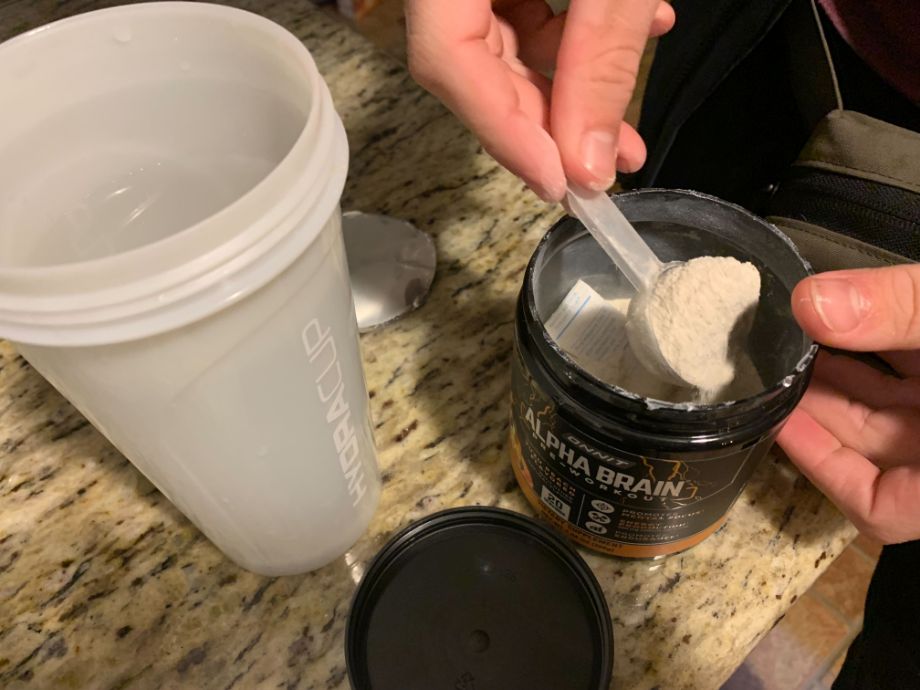
Caffeine can impact the cardiovascular system by raising blood pressure and heart rate, which can be dangerous for individuals with heart problems. Taking too much caffeine can make you feel like your heart is racing, trigger heart palpitations, or lead to chest pain, even if you don’t have heart problems.
RELATED: Is Pre-Workout Bad or Your Heart?
Caffeine may also interact with some prescription drugs. If you’re taking medication, get your doctor’s okay before adding a pre-workout or more caffeine to your training routine.
Stim vs. Stim-Free Pre-Workouts
Pre-workout with caffeine isn’t the right choice for everyone. Whether caffeine doesn’t agree with you, you can’t consume it for medical reasons, or you simply choose the decaf life, there are plenty of pre-workouts that don’t contain caffeine that can still help you get a better workout.
Pre-workouts made without caffeine or any other stimulant ingredients are known as stim-free pre-workouts. Stim-free pre-workouts won’t deliver the same hit of energy as a stim pre-workout, so don’t expect a stim-free pre-workout to help wake you up in the wee hours or after a long day at the office.
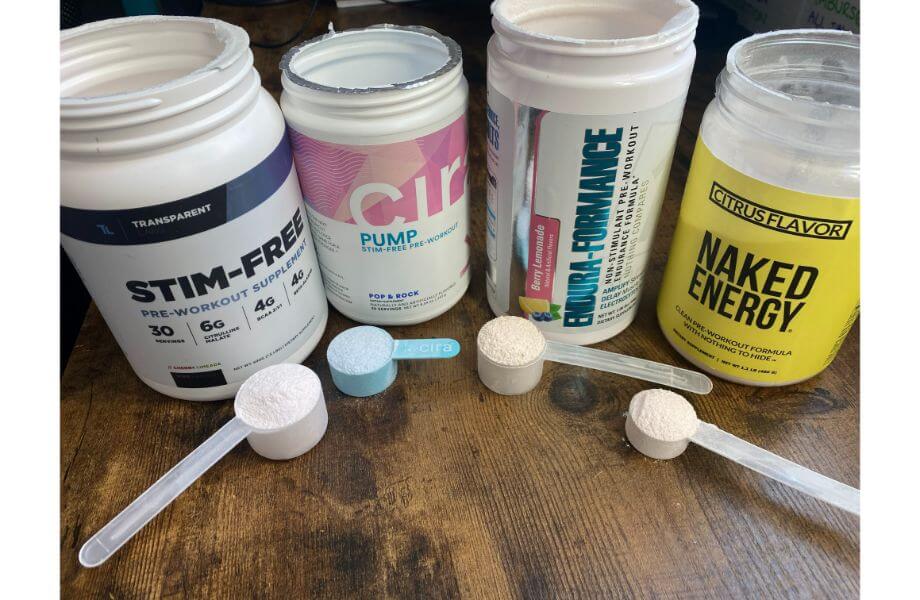
Stim-free pre-workouts typically contain the same common ingredients found in most caffeine-based pre-workouts, like BCAAs, creatine, and nitric oxide boosters, to support muscular strength, endurance, and recovery.
RELATED: Stim Vs. Non-Stim Pre-Workout
Let’s take a closer look at some of the other ingredients found in both stim and stim-free pre-workouts and how they can benefit workout performance.
Other Common Ingredients in Pre-Workout
Most pre-workouts are formulated with other ingredients, besides caffeine, that can enhance your physical performance during exercise. Common pre-workout ingredients include:
Branched-Chain Amino Acids (BCAAs)
There are three BCAAs, which also happen to be essential amino acids: leucine, isoleucine, and valine. While all amino acids can support muscle growth, these three have been linked to stimulating muscle protein synthesis. Research has also found supplementing with BCAAs may delay fatigue and support workout recovery by reducing muscle soreness7.
RELATED: Best Pre-Workout With BCAAs
Beta-Alanine
Beta-alanine is a non-essential amino acid that helps regulate the amount of acid in your muscles. As acid builds up in your muscles, it causes them to fatigue faster. Beta-alanine reduces acid, delays muscle fatigue, and helps improve muscular endurance so you can complete a few more weighted presses or squats before your muscles call it quits. Beta-alanine is also responsible for the itching or tingling sensation that occasionally comes with a pre-workout supplement.
B Vitamins
B vitamins play an essential role in producing cellular energy8 from adenosine triphosphate (aka ATP), so they’re often added to pre-workout to support energy levels.
Creatine
Creatine helps your muscles produce more cellular energy9 in the form of ATP. The more energy your muscles have, the more work they can do, resulting in more strength and lean mass gains. Like BCAAs, creatine can also speed up post-workout recovery.
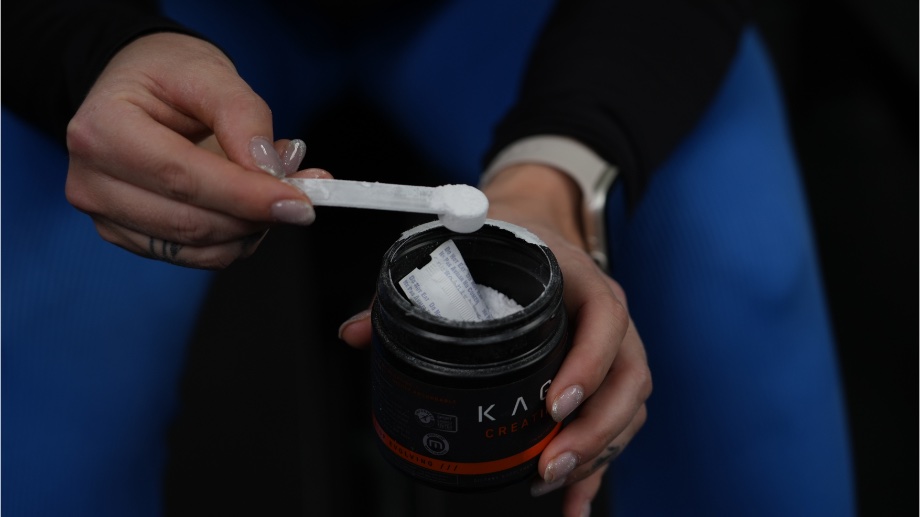
RELATED: Best Pre-Workout With Creatine
L-Citrulline
L-citrulline is an example of a pump enhancer. It helps dilate blood vessels and improve blood flow to muscles, enhancing strength and power output10.
Pre-workouts combining one or more of the above ingredients plus caffeine in evidence-based amounts could greatly enhance physical and mental performance during exercise.
How Much Caffeine Is In Pre-Workout? Final Thoughts
Most pre-workouts contain caffeine to help you feel more awake and energized. Caffeine has been researched extensively for safety and use as a performance-enhancing substance. It’s also been linked to improvements in overall endurance, strength, and focus during exercise.
There’s no standard for how much caffeine should be in pre-workout. Some pre-workouts have the same amount of caffeine as one cup of coffee, while others have the equivalent of several cups. High-stim pre-workout typically contains 300 to 400 milligrams of caffeine per serving.
RELATED: Coffee Vs. Pre-Workout
Your individual tolerance to caffeine and caffeine intake from other sources can help you determine how much caffeine to get from a pre-workout.
- The FDA recommends healthy adults consume no more than 400 mg caffeine per day.
- Researchers suggest taking 3 to 6 mg caffeine per kilogram of body weight for improved exercise performance.
- High doses of caffeine have an increased risk of side effects.
- Side effects include jitters, headache, nausea, loss of sleep, and changes to blood pressure and heart rate.
These statements have not been evaluated by the Food and Drug Administration. This product is not intended to diagnose, treat, cure, or prevent any diseases.
How Much Caffeine Is In Pre-Workout? FAQs
Is 400 mg of caffeine too much for pre-workout?
Pre-workout with 400 milligrams of caffeine per serving is considered a high-stim supplement. The Food and Drug Administration advises that 400 milligrams of caffeine per day is safe for most adults, but that refers to all sources of caffeine you may consume in a day. If you’re consuming other sources of caffeine, like coffee, tea, or soda, 400 milligrams of caffeine in a pre-workout will exceed the daily limit. Likewise, if you’re sensitive to caffeine, a high-stim pre-workout will be too much and more likely to cause side effects.
How much caffeine is OK for pre-workout?
Research says 200 to 400 milligrams of caffeine per serving of pre-workout is most effective for improving exercise performance2. The benefits appear to increase proportionately to the amount of caffeine. However, more isn’t always better. If you’re prone to side effects after consuming caffeine or getting caffeine from other sources, you’ll want to be more thoughtful about your daily caffeine intake.
What pre-workout has the most caffeine?
High-stim pre-workouts typically contain 300 to 400 milligrams of caffeine per serving, the equivalent of three to four cups of regular coffee. Based on the pre-workouts we’ve researched and reviewed, these options pack the most caffeine:
– Kaged Pre-Kaged Elite: 388 mg per serving
– Nutrition Cartel El Jefe: 400 mg per serving
– Huge Supplements Wrecked Pre-Workout: 400 mg per serving
If you’re looking for a high-stim pre-workout, check out our round-up of the top
strong pre-workouts.
Are pre-workouts healthy?
Pre-workouts can support health by boosting energy and stamina during exercise and may even support workout recovery. However, many pre-workouts can also contain caffeine, artificial flavors, or artificial sweeteners, which may or may not be desirable depending on your health and nutrition goals. If you don’t want caffeine or artificial ingredients, look for stim-free and/or clean-label pre-workouts.
References
- Maughan RJ. Nutritional ergogenic aids and exercise performance. Nutr Res Rev. 1999 Dec;12(2):255-80. doi: 10.1079/095442299108728956. PMID: 19087454.
- Guest NS, VanDusseldorp TA, Nelson MT, et al. International society of sports nutrition position stand: caffeine and exercise performance. J Int Soc Sports Nutr. 2021;18(1):1. Published 2021 Jan 2. doi:10.1186/s12970-020-00383-4
- Collado-Mateo D, Lavín-Pérez AM, Merellano-Navarro E, Coso JD. Effect of Acute Caffeine Intake on the Fat Oxidation Rate during Exercise: A Systematic Review and Meta-Analysis. Nutrients. 2020;12(12):3603. Published 2020 Nov 24. doi:10.3390/nu12123603
- FDA. Spilling the Beans: How Much Caffeine is Too Much? U.S. Food and Drug Administration. Published December 12, 2018.
- de Souza JG, Del Coso J, Fonseca FS, et al. Risk or benefit? Side effects of caffeine supplementation in sport: a systematic review. Eur J Nutr. 2022;61(8):3823-3834. doi:10.1007/s00394-022-02874-3
- Temple JL, Bernard C, Lipshultz SE, Czachor JD, Westphal JA, Mestre MA. The Safety of Ingested Caffeine: A Comprehensive Review. Front Psychiatry. 2017;8:80. Published 2017 May 26. doi:10.3389/fpsyt.2017.00080
- Khemtong C, Kuo CH, Chen CY, Jaime SJ, Condello G. Does Branched-Chain Amino Acids (BCAAs) Supplementation Attenuate Muscle Damage Markers and Soreness after Resistance Exercise in Trained Males? A Meta-Analysis of Randomized Controlled Trials. Nutrients. 2021 May 31;13(6):1880. doi: 10.3390/nu13061880. PMID: 34072718; PMCID: PMC8230327.
- Tardy AL, Pouteau E, Marquez D, Yilmaz C, Scholey A. Vitamins and Minerals for Energy, Fatigue and Cognition: A Narrative Review of the Biochemical and Clinical Evidence. Nutrients. 2020 Jan 16;12(1):228. doi: 10.3390/nu12010228. PMID: 31963141; PMCID: PMC7019700.
- Clark JF. Creatine and phosphocreatine: a review of their use in exercise and sport. J Athl Train. 1997 Jan;32(1):45-51. PMID: 16558432; PMCID: PMC1319235.
- Gonzalez AM, Townsend JR, Pinzone AG, Hoffman JR. Supplementation with Nitric Oxide Precursors for Strength Performance: A Review of the Current Literature. Nutrients. 2023 Jan 28;15(3):660. doi: 10.3390/nu15030660. PMID: 36771366; PMCID: PMC9921013.


